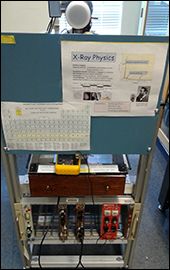Description

A cooled intrinsic germanium solid-state X-ray detector.
This experiment investigates the production and absorption of x-rays. A cooled intrinsic germanium solid-state x-ray detector is used to measure the spectra of x-rays under a variety of circumstances that illustrate several of the important phenomena of x-ray physics. Phenomena observed and measured include the production of x-rays by fluorescent excitation, bremsstrahlung, and electron-positron annihilation and the absorption of x-rays by photoelectric interactions, Compton scattering, and pair production.
The energies of the K x-ray lines of numerous elements are measured and compared with the predictions of Moseley’s Law. The energy separations and relative intensities of the Ka and Kb lines are measured and compared with the theory of fine structure in the n=2 orbitals.
Lab Guide
References
Moseley, H. G. J. “The High-Frequency Spectra of the Elements, Part I.” Philosophical Magazine, no. 26 (1913): 1024.
———. “The High-Frequency Spectra of the Elements, Part II.” Philosophical Magazine, no. 26 (1913): 1024.
Compton, Arthur H. “The Spectrum of Scattered X-Rays.” The Physical Review 22, no. 5 (November 1923): 409-413. Second Series.
Siegbahn, Karl Manne Georg. Nobel Prize Lecture, “The X-ray Spectra and the Structure of the Atoms.” (1924).
Compton, Arthur Holly. Nobel Prize Lecture, “X-rays as a Branch of Optics.” (1927).
Compton, Arthur H., and Samuel K. Allison. “The Interpretation of X-ray Spectra.” In X-Rays in Theory and Experiment. 2nd ed. New York, NY: D. Van Nostrand, 1935, pp. 590-595 and 647-655.
Bearden, J. A. “X-Ray Wavelengths.” Reviews of Modern Physics 39, no. 1 (1967): 78-124.
Way, K. “Atomic Data Related to X and XUV Radiation.” In Atomic Data and Nuclear Data Tables 22 (1978): 125-130.
Krause, M. O., and J. H. Oliver. “Natural Linewidths of Atomic K and L Levels, K-alpha X-Ray Lines.” Journal of Physical and Chemical Reference Data 8, no. 2 (1979): 329-338.










